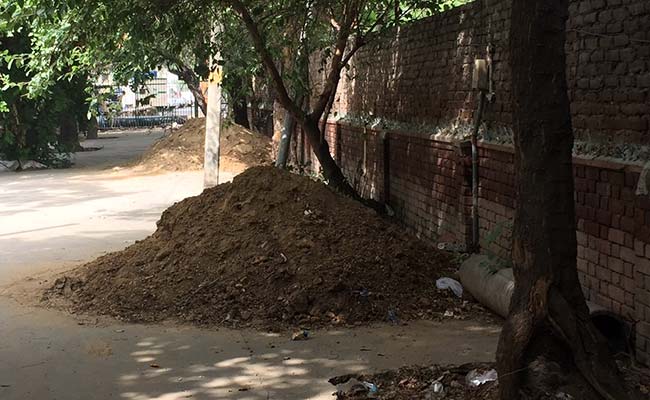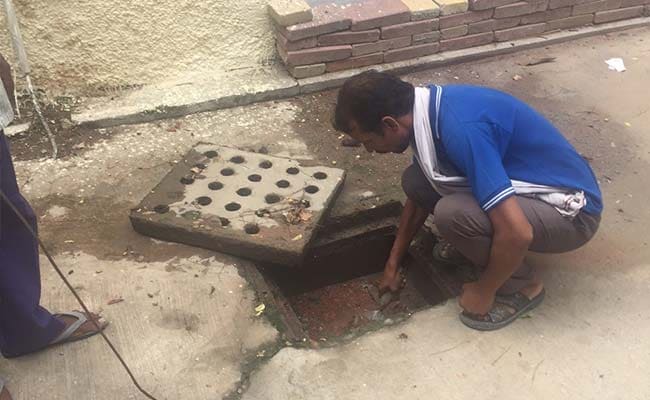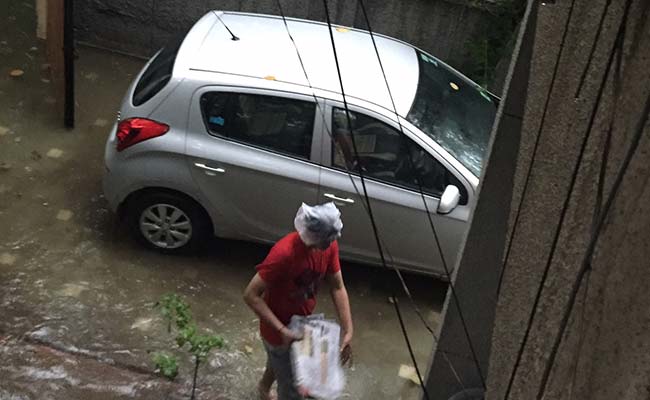
Each time I have returned to Delhi, the last hour before entering the city has always been one of happy expectation. It has been so since I went to boarding school (at age 7) and since then, year, after year, coming home to Delhi lifted one's spirits - there always that built-in anticipation of being back in my city, with my family and my friends, and familiar surroundings.
And so it was this time, three weeks ago, when I returned from a blissful holiday. Trying, with growing impatience, to look out of the window of the plane to see my city below. The rush to get through immigration and customs and be on my way home. The high that lasts in the terminal comes to a devastatingly quick end as soon as you exit the air-conditioned space to a cacophony of horns, voices, cars and realize this is reality, this is Delhi.
As you fight your way across three lanes to your car (there is zero coordination for traffic at the new fancy airport), you are met by chaos at the police booth on the furthest lane. Cars are parked haphazardly as people struggle to get bags and themselves into their cars. Nowhere in the world is there such chaos as at Delhi Terminal 3. The Battle of Living in Delhi begins immediately upon arrival, even for old-timers to the city.
Three weeks since then and I have on average spent over an hour a day trying desperately trying to get our house and lane monsoon-proof. This involves calling every department in the Municipal Corporation of Delhi or MCD, the local councilor, the Delhi Jal Board and making enough of a nuisance of oneself to make something happen.
Courtesy the High Court, the MCD ordered the un-cementing of the areas around trees in Delhi so that the concrete would not choke them. This was a good thing. But the area that was dug open had to be filled with mud. So, the MCD contractor came and plunked three huge mounds of mud near our house in May. And then they forgot about it.

When I called the control room, they passed me onto the horticulture department. They denied all knowledge of the mounds of mud, and even the existence of trees, even though someone had come and neatly etched a number on them. (So now you can actually count the trees in your locality.) Next I tried my local MCD engineer. At first, he said he knew nothing about it, but would check. I pleaded with him that if these mounds weren't removed they would, with the monsoon rain, flow in to the drainage system and block it forever. He said he wasn't in charge of drainage but would see what he could do.
Meanwhile, I continued a losing battle with my Municipal Councillor, and she with the Project Division, to provide (i.e. build) proper open deep storm water drains as they had already done in the rest of the colonies in our area. When I moved into this house 20 years ago, we had large, open, uncovered drains to carry the rush of monsoon rain away. That was true of most of Delhi. Then suddenly, seven years ago, the MCD arrived, laid six-inch pipes and covered the storm drains and placed small 18x18 inches perforated manhole to capture this torrent of water. Obviously there was a huge mismatch when it rained: how could 6-inch drains handle two inches of rain water? The road and sometimes the ground floor would get flooded. Did the MCD care? Not at all. Obviously, it was in someone's interest to spend (waste) all this money. The other problem is that these drains are impossible to clean without a desilting machine, which of course does not exist. So after a while, all these lovely drains are choked.

Chasing the various people who are supposed to maintain all these drains was like doing a telephone merry-go-round. From the control room, to the supervisor, to another person (not my area) to third, (I only handle large drains) and endless messages to the poor municipal councillor.
Then suddenly something seemed to fall into place. The MCD finally acknowledged ownership of the piles of mud and people came to fill the area around the trees. Another junior engineer arrived with a couple of people to try and clear the storm drains. I seemed to be on a winning wicket.
Not for long. The Delhi Jal Board presented me a water bill of Rs 50,000. With arrears of Rs 47,000. How did they manage this feat? They claimed that this was the charge from last May to this May. But I had paid every bill in between, and no other bill showed any arrears. They I figured it out: with a sleight of hand, they had moved all my payments down a couple of years and now claimed a deficit. And guess what, they gave me two weeks to pay, and when I sent someone to the department to challenge this, the person there was on leave, so nobody could explain how all the numbers had moved. Pay or we cut the line.
This Saturday, our early hours went watching whether the water level would rise enough to start flooding the ground floor. Since there was no electricity (it was gone with the first downpour), we opened the windows and hoped that the dengue mosquitoes would not bite us. Around 8 am, the poor newspaper delivery boy waded down the road to leave our soggy newspapers on the ledge. At the same time, I began to work the phone to get help. Our councillor finally heeded my pleas and sent a team by 10 am to open the drains so that we could at least get out of the house and to work. Chasing the BSES to restore our power supply was less productive. First they said it was series of small breakdowns, then two hours later, that it was supply failure.

If all this sounds privileged, it is, but if the privileged are struggling to get services, what about those in Tughlaqabad, whose narrow gullies and wall-to-wall houses literally drown in the first shower, where electricity is erratic at best and sweeping and cleaning is a pipe dream? Or East Delhi, where there is no sunshine in the lanes because they are crowded so close together.
Delhi is the spoilt capital of India, but the fact is that even here, the infrastructure is more than creaking; it is held together by rubber bands which regularly snap, and when they do, the city comes to a standstill as it did on Thursday evening after a huge downpour. So, as we are about to launch Phase 4 of the metro and give ourselves 400-plus kilometres of this service, someone needs to figure out a more sustainable way of rebuilding the rest of the infrastructure of the city.
Arvind Kejriwal has been shouting himself hoarse about statehood and getting power from the central government. Even in his TalktoAK session on Sunday, he talked about opinion polls to allege that the people of Delhi want what he does - removing the union territory tag. Let's get real. No central government is going to handover Delhi to a state government. Which union government would risk the likes of Kejriwal in charge of Delhi Police? He would arrest all its ministers!
Kejriwal is right that he needs more power, but rather than chase the dream of driving the central government out Delhi, why doesn't he try and unite the municipalities under one Delhi Government? That's where many of the services that people want are based. Today we live in a city where storm drains are with the municipality, the sewage with the state government, roads are divided between the two, and pavements have disappeared because neither cares about pedestrians. Kejriwal doesn't raise this because he knows the infrastructure is weak. Instead, as he prefers having a Rs 526 crores on advertising budget for his achievements. Everyone knows where the roads get flooded, but with proper water harvesting (as Nizamuddin East has done) and desilting drains with modern equipment, people would not have to drown every time it rained.
The alternative to this life is to run away to Gurgaon and live in one of those self contained complexes, where no one knows where the water comes from (mainly tube wells) and nobody cares where the sewage and garbage goes, as long as one doesn't see it, while the generators run for 16 hours a day spewing diesel waste.
(Ishwari Bajpai is Senior Advisor at NDTV)
Disclaimer: The opinions expressed within this article are the personal opinions of the author. The facts and opinions appearing in the article do not reflect the views of NDTV and NDTV does not assume any responsibility or liability for the same.
And so it was this time, three weeks ago, when I returned from a blissful holiday. Trying, with growing impatience, to look out of the window of the plane to see my city below. The rush to get through immigration and customs and be on my way home. The high that lasts in the terminal comes to a devastatingly quick end as soon as you exit the air-conditioned space to a cacophony of horns, voices, cars and realize this is reality, this is Delhi.
As you fight your way across three lanes to your car (there is zero coordination for traffic at the new fancy airport), you are met by chaos at the police booth on the furthest lane. Cars are parked haphazardly as people struggle to get bags and themselves into their cars. Nowhere in the world is there such chaos as at Delhi Terminal 3. The Battle of Living in Delhi begins immediately upon arrival, even for old-timers to the city.
Three weeks since then and I have on average spent over an hour a day trying desperately trying to get our house and lane monsoon-proof. This involves calling every department in the Municipal Corporation of Delhi or MCD, the local councilor, the Delhi Jal Board and making enough of a nuisance of oneself to make something happen.
Courtesy the High Court, the MCD ordered the un-cementing of the areas around trees in Delhi so that the concrete would not choke them. This was a good thing. But the area that was dug open had to be filled with mud. So, the MCD contractor came and plunked three huge mounds of mud near our house in May. And then they forgot about it.

When I called the control room, they passed me onto the horticulture department. They denied all knowledge of the mounds of mud, and even the existence of trees, even though someone had come and neatly etched a number on them. (So now you can actually count the trees in your locality.) Next I tried my local MCD engineer. At first, he said he knew nothing about it, but would check. I pleaded with him that if these mounds weren't removed they would, with the monsoon rain, flow in to the drainage system and block it forever. He said he wasn't in charge of drainage but would see what he could do.
Meanwhile, I continued a losing battle with my Municipal Councillor, and she with the Project Division, to provide (i.e. build) proper open deep storm water drains as they had already done in the rest of the colonies in our area. When I moved into this house 20 years ago, we had large, open, uncovered drains to carry the rush of monsoon rain away. That was true of most of Delhi. Then suddenly, seven years ago, the MCD arrived, laid six-inch pipes and covered the storm drains and placed small 18x18 inches perforated manhole to capture this torrent of water. Obviously there was a huge mismatch when it rained: how could 6-inch drains handle two inches of rain water? The road and sometimes the ground floor would get flooded. Did the MCD care? Not at all. Obviously, it was in someone's interest to spend (waste) all this money. The other problem is that these drains are impossible to clean without a desilting machine, which of course does not exist. So after a while, all these lovely drains are choked.

Chasing the various people who are supposed to maintain all these drains was like doing a telephone merry-go-round. From the control room, to the supervisor, to another person (not my area) to third, (I only handle large drains) and endless messages to the poor municipal councillor.
Then suddenly something seemed to fall into place. The MCD finally acknowledged ownership of the piles of mud and people came to fill the area around the trees. Another junior engineer arrived with a couple of people to try and clear the storm drains. I seemed to be on a winning wicket.
Not for long. The Delhi Jal Board presented me a water bill of Rs 50,000. With arrears of Rs 47,000. How did they manage this feat? They claimed that this was the charge from last May to this May. But I had paid every bill in between, and no other bill showed any arrears. They I figured it out: with a sleight of hand, they had moved all my payments down a couple of years and now claimed a deficit. And guess what, they gave me two weeks to pay, and when I sent someone to the department to challenge this, the person there was on leave, so nobody could explain how all the numbers had moved. Pay or we cut the line.
This Saturday, our early hours went watching whether the water level would rise enough to start flooding the ground floor. Since there was no electricity (it was gone with the first downpour), we opened the windows and hoped that the dengue mosquitoes would not bite us. Around 8 am, the poor newspaper delivery boy waded down the road to leave our soggy newspapers on the ledge. At the same time, I began to work the phone to get help. Our councillor finally heeded my pleas and sent a team by 10 am to open the drains so that we could at least get out of the house and to work. Chasing the BSES to restore our power supply was less productive. First they said it was series of small breakdowns, then two hours later, that it was supply failure.

If all this sounds privileged, it is, but if the privileged are struggling to get services, what about those in Tughlaqabad, whose narrow gullies and wall-to-wall houses literally drown in the first shower, where electricity is erratic at best and sweeping and cleaning is a pipe dream? Or East Delhi, where there is no sunshine in the lanes because they are crowded so close together.
Delhi is the spoilt capital of India, but the fact is that even here, the infrastructure is more than creaking; it is held together by rubber bands which regularly snap, and when they do, the city comes to a standstill as it did on Thursday evening after a huge downpour. So, as we are about to launch Phase 4 of the metro and give ourselves 400-plus kilometres of this service, someone needs to figure out a more sustainable way of rebuilding the rest of the infrastructure of the city.
Arvind Kejriwal has been shouting himself hoarse about statehood and getting power from the central government. Even in his TalktoAK session on Sunday, he talked about opinion polls to allege that the people of Delhi want what he does - removing the union territory tag. Let's get real. No central government is going to handover Delhi to a state government. Which union government would risk the likes of Kejriwal in charge of Delhi Police? He would arrest all its ministers!
Kejriwal is right that he needs more power, but rather than chase the dream of driving the central government out Delhi, why doesn't he try and unite the municipalities under one Delhi Government? That's where many of the services that people want are based. Today we live in a city where storm drains are with the municipality, the sewage with the state government, roads are divided between the two, and pavements have disappeared because neither cares about pedestrians. Kejriwal doesn't raise this because he knows the infrastructure is weak. Instead, as he prefers having a Rs 526 crores on advertising budget for his achievements. Everyone knows where the roads get flooded, but with proper water harvesting (as Nizamuddin East has done) and desilting drains with modern equipment, people would not have to drown every time it rained.
The alternative to this life is to run away to Gurgaon and live in one of those self contained complexes, where no one knows where the water comes from (mainly tube wells) and nobody cares where the sewage and garbage goes, as long as one doesn't see it, while the generators run for 16 hours a day spewing diesel waste.
(Ishwari Bajpai is Senior Advisor at NDTV)
Disclaimer: The opinions expressed within this article are the personal opinions of the author. The facts and opinions appearing in the article do not reflect the views of NDTV and NDTV does not assume any responsibility or liability for the same.
Track Latest News Live on NDTV.com and get news updates from India and around the world

